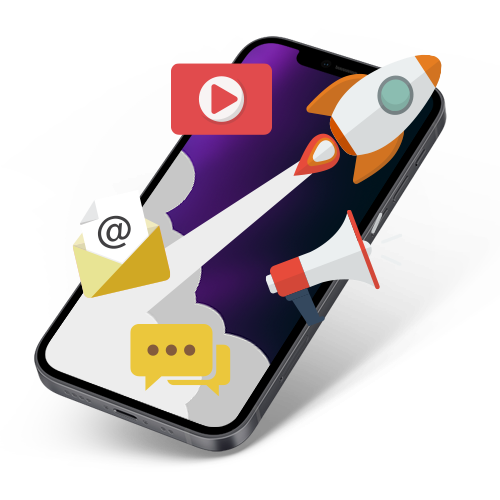DIGITAL MARKETING
Digital marketing is the practise of promoting a good or service through digital channels such websites, social media, email, and search engines. Businesses can use it to reach a wider audience and interact with customers in fresh and creative ways. Search engine optimisation (SEO), pay-per-click (PPC) advertising, social media marketing, content marketing, and email marketing are some popular strategies used in digital marketing. Digital marketing efforts can be customised to specific target audiences and their effectiveness can be tracked in real-time by using data and analytics.
SOCIAL MEDIA
MARKETING
Utilising social media sites like Facebook, Instagram, Twitter, and LinkedIn to market a good or service is known as social media marketing. To increase brand recognition and boost sales, it may involve producing and sharing content, executing social media advertisements, and interacting with customers.
Developing a social media strategy, producing and curating content, interacting with customers, measuring and analysing results are some important aspects of social media marketing. Social media marketing enables companies to both target specific demographics and a sizable, engaged audience. Additionally, it can increase customer loyalty, foster brand trust, and promote website traffic.
- Creative Visuals For Facebook & Instagram Ads
- Targeting & Re-targeting
- Dedicated Lead Strategist & Account Manager
- Custom Audience Ads
- Weekly Reporting
- Real-Time Analytics

SEARCH ENGINE
OPTIMIZATION (SEO)
The practise of optimising a website or online piece of content for search engine results pages (SERPs) is known as search engine optimisation (SEO). Businesses can boost their search engine ranks and increase organic traffic to their websites by making adjustments to the website's structure, content, and keywords as well as the way it is linked to other websites.
The following are some essential SEO components:
- keyword research: A website's content and meta tags should contain the keywords and phrases that potential buyers are searching for, according to
- On-page optimization: is the process of improving a website's navigation, text, and pictures to make it more relevant to visitors and search engines.
- Link building: Obtaining links pointing to a company's website from other websites to boost its authority and visibility.
- Technical SEO: Improving the website's technical foundations, such as site speed and mobile friendliness, to make sure that search engines can easily crawl and index it.
- Measuring and evaluating: Monitoring and evaluating the performance of the website on search engines and making necessary improvements to enhance the outcomes.

SEARCH ENGINE
MARKETING
The process of employing paid advertising on search engine results pages (SERPs) to advertise a good or service is known as search engine marketing (SEM). Pay-per-click (PPC) advertising, which enables companies to display advertisements on SERPs and only pay when a user clicks on their ad, is the most widely used type of SEM.
Businesses can use SEM to target particular demographics and keywords, and when users search for those terms, their ads will show up on the SERPs. This enables intense targeting and can increase the quality of traffic to a website.
Platforms like Google advertisements and Bing Ads, where businesses may specify a budget for their campaign, select keywords, and develop and publish advertisements, can be used to manage SEM campaigns. Additionally, these platforms offer thorough analytics and reporting, enabling companies to assess the effectiveness of their campaigns and make necessary changes.
SEM is a terrific technique to achieve quick results and can work well in conjunction with SEO, which is a more long-term approach. While SEO can help to enhance the website's organic search rankings over time, SEM can help to boost brand awareness and generate sales in the immediate term.
- Bid Management
- Fraud Activity Monitoring
- Conversion Analysis Reporting
- Periodic Consultations with Experts

formerly known as Google AdWords
Google Ads /PPC
A platform called Google Ads (formerly known as Google AdWords) enables companies to design and manage pay-per-click (PPC) advertising campaigns on Google and its affiliate websites. PPC advertising enables companies to publish advertisements on SERPs and only pay when a user clicks on their advertisement.
Businesses may target particular demographics and keywords using Google Ads so that their ads show up on the SERPs when users search for such terms. This enables intense targeting and can increase the quality of traffic to a website.
The platform offers a variety of ad forms, such as text, display, video, and retail ads, that can be utilized to meet various business goals. Businesses can choose keywords, design and publish ads, and set a budget for their campaign. Additionally, Google Ads offers thorough analytics and reporting that let companies assess the effectiveness of their campaigns and make necessary changes.
Google Ads is a potent tool for generating quick results and can be a useful addition to SEO, which is a more long-term tactic. While SEO can help to enhance the website's organic search rankings over time, PPC can help to boost brand awareness and generate sales in the short term.
- Keyword & Industry Analysis
- Ad Copy Creation
- Detailed Reporting
- Weekly Meeting with Experts